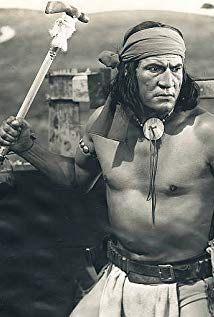Ann leads the outlaws
Robert L Lippert, owner of a chain of theaters, formed Screen Guild Productions in 1945, dissatisfied with what he believed to be exorbitant rental fees for pictures charged by major studios. He would make his own. The company’s first release was a Bob Steele Western, Wildfire, shot in Cinecolor, no less – see review. Eight pictures came out in 1946, many of them Westerns, and one of them was Renegade Girl.
It’s a simple 105-minute black & white oater of the period, no great shakes really but worth a look, at least once. William Berke, the director, helmed 90 films and produced nearly 80 (including this one). He started as an actor in silent Westerns. Oscar-winning director Richard Fleischer in his memoir recalled that Berke “was known as King of the Bs. For years and years he had made nothing but pictures with ten or twelve day shooting schedules, minuscule budgets of about $100,000 and no stars. Without bothering with editing or any postproduction chores and with short shooting schedules, he was able to squeeze in eight or ten pictures a year. And he was going nuts”. But Berke knew what he was doing, and he churned them out on-time and on-budget.
Berke had also directed Saddles and Sagebrush. In an interview Savage remembers: “William Berke directed this picture, and he was nice. I worked with him a number of times. It was all like family. It was nice, being at a studio, learning your trade while being paid.”
Savage said, “I was afraid of horses, and I almost didn’t make Renegade Girl. My husband [Bert D’Armand] was also my agent, and he said, ‘Oh, come on, they’ll get the best double for you.’ So, they got Jennifer Jones’s double from Duel in the Sun, and you can’t go wrong with that! Vivian Lopez was her name, I think.”
Missouri, 1864. Savage is Jean Shelby, a Confederate-sympathizing gal who falls for a Union captain Fred Raymond (Alan Curtis). She’s a tough cookie but Capt. Raymond is awfully gallant and has a very dashing pencil mustache. It will be lerve.
Unfortunately, though, Capt. Raymond is charged by Major Barker (our old pal Jack Holt) with finding and arresting a certain Bob Shelby – who happens to be Jean’s bro (Jimmy Martin). That’s awkward.
The situation is complicated by the fact that another fellow is smitten with Jean, Jerry Long (Russell Wade). And he is prepared to stoop to skullduggery to elbow the captain out of the way and get his hands on the fair Jean.
Savage said, “Alan Curtis and Russell Wade were so sweet, nice men, and so good looking. It was such a shame Alan died so young [in 1953, aged 43, after a kidney operation.] My husband and I had just moved to New York when I read about it in the papers. I felt so badly. And Russell Wade is so handsome, and so wonderful to work with. Jack Holt was a big star, he was charming; it was delightful to be working with him. For that scene I just stood in the middle as I recall, but it was very nice, I enjoyed making the film.”
Second-billed Curtis never quite made it to stardom but he had some memorable smaller roles, and he did a few Westerns, even leading in two. Wade had a short time in the limelight (he won a contract at RKO) and he too did a few oaters, especially Tim Holt ones, but he also topped the billing in one, Sundown Riders in 1944.
The Indians are the real baddies in this one, though. They are led by Chief White Cloud (played by Chief Thundercloud aka Victor Daniels, who was given the title of Chief in a somewhat, er, honorary capacity and identified himself as Cherokee, although is background is vague). The chief has a grudge against the Shelbys and will stop at naught (naught, I say) to get his revenge. He even has his attacking and whooping braves ride round and round a church. How bad is that!
Jean thinks the captain has abandoned her (he’s actually only fighting bravely) and she goes all hard, and leads a band of ex-guerrillas who become outlaws. And she stands for no nonsense from the men.
Jean’s brother rode with Quantrill and the famed guerrilla leader makes a brief appearance – it’s none other than good old Ray Corrigan. So Crash joined the long list of actors who played William Clarke. But most of the story is set after the war, when Quantrill (they all give him the common pronunciation Quantrell) was no more.
Will the lovebirds finally meet up again and live happily ever after? Ah, that would be telling…








